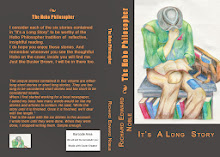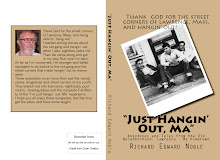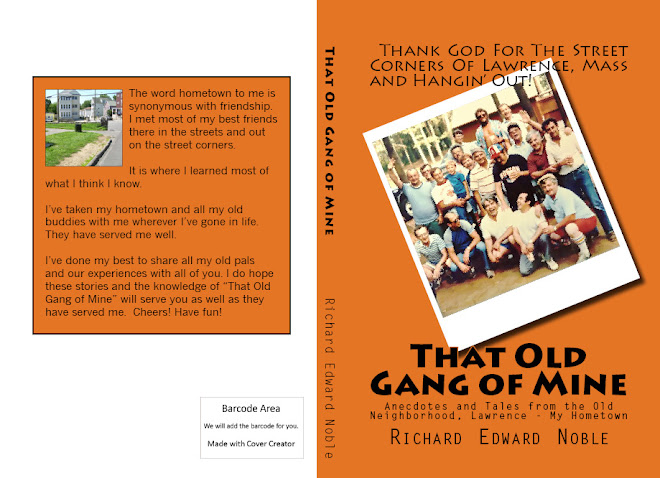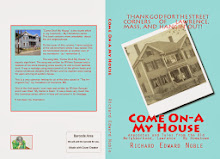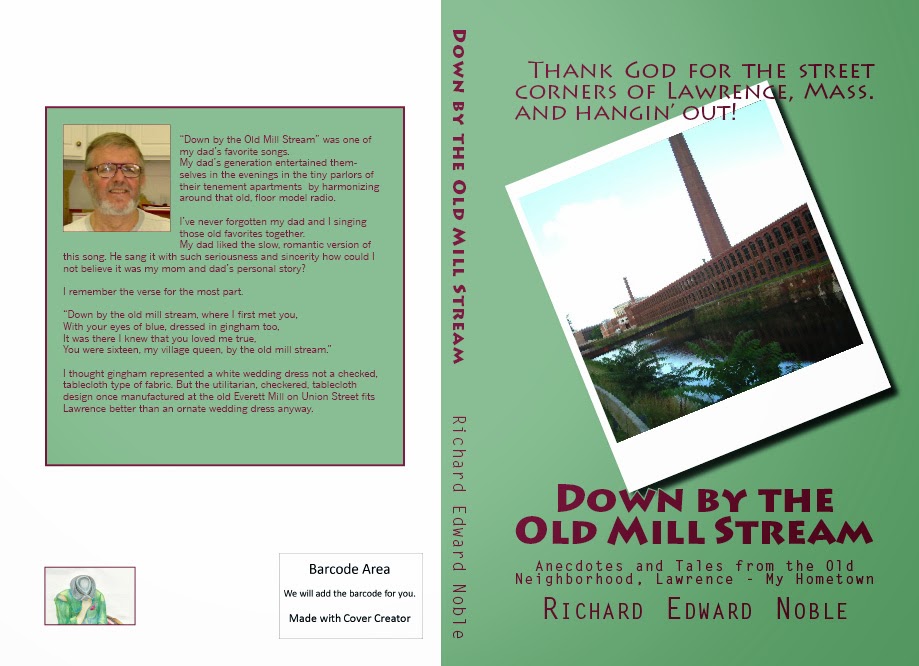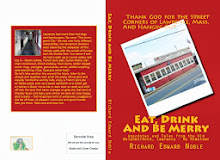 Lawrence – My Hometown
Lawrence – My HometownEddie Solomon’s Market
By Richard E. Noble
I was working part time at Eddie’s Market on Broadway. It was a mid-sized supermarket. Bigger than a corner store but smaller than a First National or a Stop & Shop.
Eddie Solomon was the owner and he was running the place alone. Eddie, like many of the ethnic shops in Lawrence had his nucleus of loyal customers and then branched out into the general populous.
Eddie’s thriving little corner supermarket had devolved as the neighborhood deteriorated over the years and by this time most of Eddie’s branches had broken off. He was now down to his treasured nucleus once again.
The bulk of his business was via the telephone and he delivered. He had a high school kid who delivered the boxes of groceries to people’s doorsteps – first, second and third floor doorsteps. I know my friend Peter Shaheen worked as a delivery boy for Eddie while in high school. My experiences at Eddie’s Market came some years later.
The orders started rolling in on Wednesdays and Thursdays and by Saturday Eddie had a few loads all boxed up and ready for the old station wagon/panel truck. Eddie was hanging in there, scratching by, but the handwriting was on the wall.
Eddie was running the place alone because his “associate” butcher of many, many years had died or retired. Eddie made a deal with me to help him out on weekends.
I had developed my own home delivery business. It all started because Steve Brennan the owner of the meat packing house where I worked gave us workers a break on our groceries. We got whatever we wanted wholesale instead of retail. I noticed that most of the married guys were buying two or three times the meat and cold cut groceries as I was. I started taking orders from some of my buddies. Then I started selling it in wholesale quantities to friends and acquaintances. Very soon I had my own little wholesale business. I was buying and cutting up large chunks or sections of meat for friends and relatives during my lunch hour, after work and on Saturdays. Eventually I had too much business and I had to hunt a new alternative. That’s when I got introduced to Eddie Solomon.
Poor Eddie was now chained to the family market. He offered me the use of his market and facilities to order, store, and package meat for my customers in return for helping him out and watching his business with him a couple of days a week. Now he could run out for an hour or two once and awhile or take care of family business while I watched the shop. He insisted on paying me something which is one indication of the kind of person he was – and still is, I’m sure. I didn’t need it. I was doing well enough on my own. I had one fulltime job, a part time job and my home meat business on the side. Eddie’s would be my second part time job. Not to mention, I was single and still living at home. The arrangement was working out great for me and Eddie was happy too.
This short period that I worked at Eddie’s Market for Eddie Solomon surprisingly holds a lot of good memories for me. I learned to admire Eddie. Number 1, he was a great boss. Well, he wasn’t a boss at all. He was a friend.
He didn’t need me for anything. He just wanted a little company and a tiny bit of freedom. All his store work he could do himself. He watched what I was up to and I watched him.
I had the best of this deal. I had free access to Eddie’s walk-in cooler, his band saw, his cutting blocks, his hamburger grinder, his cold cut slicer, his cubing machine even his knives. I told him he didn’t have to pay me anything for helping him out. The use of his facilities was more than payment enough on his part – but he insisted. I think he paid me 30 bucks for Friday evening and all day Saturday.
I was making pretty good money for a young guy back in those days. I remember one day a customer of Eddie’s came in and wanted to cash his Social Security check. Eddie’s asked how much it was. It was close to 300 bucks.
“Can’t help you, Pal,” Eddie said. “I haven’t taken in 300 dollars today my friend.
“Wait a minute,” I said. “I’ll cash that for you.” I carried hundreds of dollars in my wallet, sometimes even a thousand or two. I paid cash for everything. Paying cash got me discounts at the wholesale house. Everybody liked cash back in those days. A thousand dollars cash was a thousand dollars cash – no taxes, no bookkeeping, and no check bouncing. I bought when I got a bargain and then I called my customers and sold what I had just bought. It was a good deal for me and a great deal for my customers. Not that good for the Internal Revenue Service but I felt they were doing very well without me – at least not all of me.
Eddie was rather surprised but he didn’t say anything. From then on when any of his customers came in with checks larger than he could cash, he would look at me and ask, “Dick, can you do $400?”
“Sure.”
I didn’t think much about it but Eddie would shake his head in disbelief.
When I decided to open up my own shop Eddie asked me, “Tell me Dick, how much are you making here a week doing this business of yours?” I didn’t really want to say because I didn’t know where this was going.
“I’m doing all right,” I said.
“You making more than a 100 a week?” he asked. I laughed.
“You making more than 200 a week?” I smiled. Eddie shook his head. “You making more than 300 a week?”
“Sometimes.”
“Dick, let me tell you something. I ain’t making that much a week running this whole place. You don’t want to open your own business. You want to come with me. I’m going to close this place down and open up a delicatessen on Lawrence St. I’m going to sell cooked food ready to take home and eat – spinach pies, kebbe, gourmet take out. I teach cooking classes over at the high school in the evenings. Everybody loves my stuff. It’s the future. Nobody has the time to cook anymore. The money is in prepared foods. I’ll teach you how to cook. You can run your little business on the side. You’ll have all the money you want.”
In retrospect, I always regretted not taking that offer. I really liked working with Eddie. As it turned out I did become a “chef,” but I think I would have enjoyed preparing Eddie’s cuisine rather than the French crème sauces that I learned. I still get hungry for stuffed grape leaves or a kebbe sandwich but I never get hungry for a bowl of shrimp and scallop bisque, or hollandaise sauce on my sautéed Sea Bass or Black Grouper. I have yet to prepare myself a Salmon fillet with a caper sauce or Blackened Redfish topped with sweet cream basil butter at home. I don’t care about Beurre Blank, Béarnaise, Béchamel, Bordelaise, Meuniere, Mirepoix, or even monosodium glutamate but I still get hungry for a Syrian salad with that unique and distinctive lemon dressing Eddie’s mom used to make for us.
His mother would cook at the market for us. I think she cooked for Eddie every day – maybe every day of his life. I was invited to eat whenever I was there. She wouldn’t tell me what she was making our supper from until after I ate it. Everything was wonderful. I ate tripe and lamb brains and stuffed intestines and hearts and every kind of crazy thing. Eddie even got me to start eating hamburger and steak … raw – a practice not recommended in today’s world. I never tried the lamb’s eyeballs – that was a bridge a little too far. My parents being a combination of Irish and Polish, I got a thousand and one ways to cook cabbage at home. Eating at Eddie’s with his mom as our cook was like dining out for lunch at some exotic restaurant. She was a little Bishop’s restaurant all by herself.
I also liked the way Eddie dealt with “family.” Here he was a businessman but it was family before business. My dad was just a laborer but it was always job before family. I had never seen a family like Eddie’s. There was more touching, hugging, kissing and laughing than I had ever seen in my life. They even seemed to enjoy their relatives.
As a businessman Eddie knew all the jokes and all the little tricks. One idea I never forgot was the “Sweetheart” roast beef. Eddie had a Sweetheart roast beef, a Honeymoon special, a Mother-in-law’s delight and a host of other unique specials.
The first time I heard him explaining his Sweetheart Special to a young woman, I couldn’t believe it. After the young woman bought her Sweetheart Special roast beef, I asked Eddie, “What the hell is a Sweetheart roast beef? I’ve been working as a butcher now for several years; I got all the information from the USDA; I know the name and section of every slice of steak and cut of beef on a steer but I have never heard of a Sweetheart Special.”
“No you haven’t. But if you buy one you will love it and you will want to get another one. When you go to the big supermarket or to that other butcher shop and ask for it, they won’t have it. So then what?”
“I go back to Eddie’s.”
“That’s right. And you will not be comparing the price of Eddie’s Sweetheart roast and buying a cheaper one anywhere else because they won’t know what you are talking about.”
The young lady who bought the Sweetheart roast was back a few weeks later. She said, “You know, I can not buy this Sweetheart roast anywhere. I live across town and I’ve gone to all the butcher shops in my area and none of them have a Sweetheart roast beef.” Eddie looked over at me and winked.
“Really, I’m surprised. It’s a favorite with all my customers.”
“Do they have another name for it that other butchers would recognize?”
“Well, in some sections of the country it is called a Honeymoon roast but I really don’t know why any butcher worth his salt wouldn’t know what a Sweetheart roast is. What do you think about that Dick?”
“I can’t imagine. These guys must be from another planet. Sweetheart roast … that’s the favorite of 7 out of every 10 butchers I know.”
She left with a Sweetheart roast and a pair of His and Her Sirloins and a Works-in-any-pot pot-roast.
“Those His and Her Sirloins are cut from a muscle never used by the steer, hidden under the spline and the Works-in-any-pot pot-roast comes from the hintermost section of the animal. If you can’t get over here next time, just ask the guy at the big supermarket about the spline or the hintermost and he should fix you right up.”
“Oh great. Thank-you so much. The spline and the hintermost, I’ll remember that.”
The next time she came in she ordered her Eddie favorites, humbly, and with no silly questions.
Richard Edward Noble is a freelance writer and columnist. His local column, the Eastpointer, won the first place 2007 humor award from the Florida Press Association. He has published several books. All of his books can be viewed and purchased on Amazon.com. Contact richardedwardnoble@gtcom.net for bookstore discounts and volume sales.















